- Home
- Chris Wraight
Valdor: Birth of the Imperium Page 13
Valdor: Birth of the Imperium Read online
Page 13
And out in the driving muck of the ice storm, where the snow and hail screamed and the frozen earth cracked, ten thousand helm-lenses suddenly ignited, then began to advance.
Thirteen
Her own people called her the Prophet. At times, she felt as if that title must always have been there, waiting and ready for activation within the Exemplars’ memories, and yet in truth, like all things, it had had its genesis. She had coined the term herself as a minor and clandestine act of rebellion long before the true revolt had ever been conceived. Even at the start, He had been so prim about the old religious tropes, and it had amused her to think of herself as the antithesis of all they were building.
And then, for a very long time, it had been nothing more than that – just a minor gesture, something to act as contingency against an unknown future. She had never been sure that the Exemplars would ever be necessary, but it had been an intellectually satisfying exercise to create them, carving out a fief within a fief, all out of sight, just in case.
Then the slide had started. The decay, the familiar pattern of degradation. Perhaps it had begun even before that night in the vaults, when the universe had been shaken by power of such magnitude that it had been hard to sleep soundly ever again. Or maybe that had indeed been the turn in the road, when the hubris of it all had become too obvious to ignore and doubt had begun to worm its way within her carefully constructed world of accomplishment.
In the very beginning, though, there had been no concerns. He had plucked her from a life of brutal obscurity, just as He had done with so many others. Warfare on Terra had been gruellingly never-ending back then, when it was still possible to countenance the annihilation of the entire species within a generation. The only way to survive had been to make yourself indispensable to those with just a few more scraps of power. The most usual way of doing so was through physical strength. With her, it had been the mind – she had proved almost preternaturally adept at mastering the crude, quasi-religious techniques of biological manipulation that still existed in the scattered techno-clades, helping to create augmented soldiery for assorted warlords in their filthy laboratoria. She had learned fast, absorbing lessons from instructors before they were killed on a whim, studying relentlessly by the light of grimy tallow candles, using every trick and technique to keep herself one step ahead of cull gangs, kidnap squads and jealous rivals.
The creatures she had helped create had been, without exception, monsters. They had led pain-wracked lives, often expiring before even reaching the battlefield, dying on their slabs amid strangled screams as their overloaded organs burst. It had never been possible to get used to that, to think of it as normal or acceptable. She still heard the screams in her many nightmares, the things she had distorted in order to keep herself alive. By that stage she had known so much genecraft that she could have left herself unmarked forever, a pristine specimen amid a world of tumbling debauchery, but she never did. She stopped ageing within, but allowed the accumulated horror to linger on her external features, the visible price paid for her many desperate bargains.
And then He had arrived. He might have killed her just as He did so many others, but He chose not to. Instead she had been taken out of the wilds and brought within the first strongholds of the nascent Imperium. Through Him, her eyes were opened to a world of purer science, of knowledge being recovered at such breakneck speed that it had felt that nothing was impossible and everything was permitted. Promotion had been rapid. She had been given command of a cell within the programme, and then a whole laboratorium, and then finally inducted into the inner circle of initiates.
‘Arduous, but essential,’ Malcador had told her, showing her the facilities to be placed at her disposal. ‘Nothing can be done without genecraft.’
And the Sigillite had been right. Things had slipped too far, and global conquest required soldiers altered at the genetic level. By the time she was brought into His confidence, the Legio Custodes was already in active service, but the secrets of their painstaking creation were kept tightly under wraps, and in any case they had never been destined for mass production. He had wanted her for something different – armies of a far greater size, built for rapid deployment, bulk-produced according to standard biological templates.
The first subjects were disasters, shambling creatures little better than the flesh-puppets they were intended to take on. The processes were subsequently honed under the privations of constant warfare, in clinics and laboratoria that were kept mobile lest they be discovered and destroyed. Some of the lore deployed was old and imperfectly understood; some of it was new and volatile. Throughout it all, He kept them all working punishingly hard, inspiring with a word or a gesture, refining their crude initial attempts when necessary, opening up new vistas of possibility, persuading, teaching.
She had often wondered, even then, how far their own work was really His, conducted indirectly through mental suggestion or inspiration. He knew so much more than any of them, and yet He could not be everywhere at once, and so they were necessary, His tools, His band of willing acolytes.
She flattered herself that some of the key insights had been hers. Having devoted so much of His intellect and energy towards perfection, she came to believe He struggled with the messier business of compromise, and thus lesser minds had their uses. There was never time for perfection, and so the Cataegis were always a compromise. They were the best that could have been created under such conditions, but nobody believed they were permanent.
That had always made her anguished, just as it had before. Under their ferocious advance, an entire world was slowly brought to heel, but there was still the old price to pay, of pain and physical corruption, only this time set against the loftier goal of recovered civilisation. So even as the Thunder Warriors reached their apogee of power and fame, their replacements were being planned. These were to be more stable, more enduring, more flexible and more disciplined. They would be created in greater numbers, manufactured in batches just like the standardised weapons that were by then pouring off Imperial production lines. Most importantly of all, they would be permanent.
‘Your progeny, Astarte,’ He had remarked once, in a rare moment of possible levity. ‘Your legacy.’
That wasn’t true. Not strictly. Everything emanated from Him ultimately, including this programme, but there had been times, times of weakness, when she had been driven into fatigue by the endless work, when she had given into that dangerous conceit, and thought of them, for a moment, as hers.
But then the day of destruction had come, when the vaults had been breached and the instigator subjects destroyed. They had been central, those twenty primal components, designed to keep the new Legions from suffering the instability of the old. Rather than a patchwork of many gene-templates, they had been there to provide a solid anchor, a means by which excess could be tethered, and now they were gone.
She remembered how it had felt. As she had run down those burning corridors, her long-bruised heart had finally broken. There were no tears, no screams, just a silent, crushing implosion within, angry and impotent. Every safeguard had been breached. Every wall they had put up had been demolished. The certainty she had allowed herself to give into, the exhilaration that now, this time, they had perfected the formula, was wrenched away.
Each night since then, the flocks of old nightmares had come back with greater force. Every morning she would wake, her sheets damp, her flaking skin shining with sweat. She had heard words, echoing in those forbidden vaults, words that no mortal should have been able to utter there, because they had only been spoken to her alone, back in those first flesh-labs where the first subjects had died.
It should have been stopped that night. She should have had the strength, then, to put an end to it. And yet, who among them had ever been strong enough to go up against Him? What arguments could possibly hold sway against the momentum created over so many decades? She could see it around her now as she
hurried through the tunnels – the things that had been built here, the enormous and complex structures, all for a single purpose. They could not row back now. Their pride would not permit them, even if it meant condemning themselves to the mistakes of the past.
And thus her long preparations had proved their worth in the end. The subtle mental imprints, the long cultivation of perfectly loyal subjects, the contingency she had kept in the shadows against a day she had never seriously thought would come to pass.
They were around her now, her secret and unsullied faithful, keeping her safe, ferrying what had to be ferried and escorting her deeper down. Their faces gave away no fear, even as the noises of pursuit rose in intensity – Valdor’s attack dogs, released at last, closing fast with all their habitual prowess.
The captain-general, though, had never been an obstacle. Valdor was merely a sentinel, charged with observing while others acted. He had watched while the Cataegis were born. He had watched while their successors had been planned. Now all he could do was watch again while it unravelled. To watch, to wait – that was his weakness, one that could never be bred out, for it was stamped into his very essence.
One of the many secrets Astarte knew was Valdor’s original name. She knew where he had been born, and what his parents had been before they had been killed. She knew why the Emperor had risked a huge amount to carry armies halfway across Terra to locate him, why the entire enterprise had almost come to nothing, and what had saved it. It was possible, though not certain, that Astarte knew more of Valdor’s early life than he did himself. He was so incurious, that one – a mask of duty, a mere cipher for the Emperor’s own will. Whenever they had met over the years, which had not been very often, the contrast between them had been painful – he, physically perfect, silent and possessed of almost complete self-assurance; she, withered by toil, gnawed by doubts. She had been told in confidence that Valdor admired her. In truth, she could not return the sentiment. If he was the pinnacle, the absolute summit of the genecrafter’s art, then perhaps it would have been better never to have started.
She could do nothing about the Custodes. They had been a fact before she had arrived, and would be a fact long after she left. But the other creations – the other experiments and deviations – her hand had been on them all. Her marks were within them, her formulations boiled and twisted within their blood, and so further work remained possible.
Just like her, the Exemplars knew the importance of this work, the last and greatest deed of her illustrious career. If a thing could not be saved, if a sample had been corrupted beyond hope, then there was only one course of action. They trusted that. They trusted her.
For she was the Prophet. And this, at last, was her time.
Fourteen
Achilla saw it all unfold. Just before they got there, he’d been shivering on the ridge, cradling his electro-maul in an armoured glove and wanting very much to use it. He’d felt the wind prise at the collar of his armour, worming the cold deep against his leather-tough skin, and waited impatiently for the order to advance.
The tanks were all thrumming with power, like iron beasts coiled for the leap forwards. Contingents of infantry stretched as far as he could see on either side of him, fully prepped for battle and palpably itching to charge down the slope. They could all see the city, tantalisingly close now, a heap of half-complete defences that looked ready to be washed away by the maelstrom.
But they were held back. Their leashes were tugged tight, all for that lone, golden devil, walking out without so much as an escort to meet the dying master of their piebald, haphazard army.
Achilla found that contemptible. If he’d been in charge, he’d have already loosed the mortars, sent the tanks trundling down to the plain and ordered the infantry squads to fall in behind them. There were no negotiations to be had here. Here, talk was, as it was everywhere else, a pointless distraction from the real business.
The first sign of trouble had been his oculus-targeter twitching. Its range-expander had been playing up ever since they had entered the heart of the storm, so he’d pulled it back from maximum power. That malfunction in itself had been odd – the device was meant to be immune from atmospheric contamination – but his mind had been fixated on the agreeable slaughter about to happen, and so he’d not paid much attention.
Then it had started twitching madly. For a second, a ludicrous second, it looked as though there were a whole new storm of signals advancing out from the northern approaches to the gate, marching in serried formation under the lightning-sparked skirts of the thunderheads. Then the reading was gone, replaced by a scream of static, and he could only see that irritating gaggle of Thunder Warriors standing out in the open like beggars haggling over scraps with the Emperor’s golden ambassador.
He shifted position, feeling his old limbs creak in the cold. Slak had his lance ready too, similarly burning to move.
‘What’re they waiting for?’ Achilla muttered.
Slak stiffened. ‘Damn,’ the big man said, softly.
‘What?’
‘Damn.’
Achilla turned on him. ‘What?’
Slak wasn’t looking at him. Slak was peering out into the storm, his helm-visor making a strange whirring sound. He must have had some kind of augur-mechanism in there. He’d kept that quiet.
Achilla turned back to the battlefield and tried to adjust his own augmetics. For a moment, all he saw was the snow gusting and the iron-dark terrain, all of it glowering under the relentless bludgeon of the wind.
Then, in a sudden data-blurt of clarity, he saw what Slak had just seen.
‘Damn,’ he breathed.
The battle-signal finally flashed across his helm-visor. The tanks’ engines gunned into life. The artillery opened up, and the infantry commanders roared out their orders to charge, and it felt like the entire ridge had suddenly dissolved into a sliding wave of movement and unfurled aggression that surged down the slope and out into the open.
Achilla went with it, breaking into the run that he’d been waiting for all along. Slak and the others tumbled along the incline after him, tripping and slipping on the ice and scree. The wind screamed in their ears, and the hard boom of discharging weaponry split the skies.
His heart thudded hard and fast, stirring his atrophied old body into uneasy action. He still didn’t know exactly what he’d seen in that one sensor-glimpse, only that it had changed everything. They’d been promised that the city would be undermanned and poorly defended, left to fend for itself by a military command hell-bent on conquest in the global west. They’d been told that the only fighting would be at the gate itself, after which they’d have free rein among the populace. There would be no plunder, they had been instructed, no atrocity, but no one had really believed that dreary talk – once these things started, you could never really drag them back.
But this was something else – something new, disciplined, numerous, moving down from the north under the cover of the breaking storm. Achilla had never seen anything like it. He didn’t even have a name for it. He was heading into it, all the same. The ground exploded around him, blasted apart by the furrowing drive of anti-infantry weapons. Tanks skidded on their tracks, hammered by an incoming wave of crackling energy beams. The slush boiled off, turning the frigid air into a steam-hell through which las-fire pinged and skipped in eye-burning spikes. The night began to glow.
‘Secure the gate!’ Achilla found himself shouting. Others were crying out the same thing, barked from a hundred different vox-emitters and helm-grilles. It was all too hurried, too disorganised – this was meant to have been a walkover.
Slak caught up with him, lumbering through a hissing miasma of condensation. His thermal lance was firing, bolt after bolt, all aimed ahead into the rolling steam-clouds.
‘What. In. Hell?’ Slak was muttering, outraged. ‘Thunder Warriors? Where’d they find Thunder Warr–’
&nbs
p; That was the last thing he ever said. A single explosive round smacked out of the murk and thunked into his chest, blasting open as it impacted on the steel plate. Slak, who was a big man wearing heavy armour, was hurled from his feet and sent cartwheeling backwards, his airborne trail marked by flecks of cordite and thrown blood.
Achilla fired blindly into the mists. The jag-rifle in his left hand kicked with every loosed shell, while the maul in his right snarled with paralysing electrical arcs.
‘Come on, then!’ he roared, running hard along with the rest. A heavy tracked carrier bounced past on the left-hand side, its turret-mounted guns pumping wildly. He could hear the screams of soldiers being cut down, but couldn’t tell where it was happening. He’d lost sight of both Ushotan and that golden devil, and now everything was an ear-ringing crash of full-throated battle, slammed up-close in a pall of sensory overload.
Then three of them emerged, thirty metres off, bursting out from the driving sleet, their armour slick from it, firing in studied bursts from guns that looked like heavy grenade launchers. They weren’t hurrying, but striding with a terrifying collective certainty, laying down impossibly accurate fire in precise volleys. Their armour was all-encompassing, a tight-knit collection of thick plate, riveted and embossed, clearly purpose-built for the wearer and emblazoned with what looked like regimental icons. It was hard to make out just what those were in the gloom and muzzle flare, but Achilla thought he caught something like a winged blade etched on a dark grey ground.
Achilla fired, dropping to one knee and emptying his rifle at the closest one. His hits shattered across the battle-armour in a scatter of flying sparks, but did little damage. Two of the warriors advanced after other targets, but the third, the one Achilla had struck, swivelled round and came after him.
For something so huge, it could move astonishingly fast, devouring the cratered terrain between the two of them in just a few loping strides. Achilla kept firing until the chamber clicked empty, hitting it with almost every shot but barely slowing it. The armour looked impervious to harm – a segmented carapace like some huge insectoid, surmounted with a plumed helm and a snarl-mask visage. The whole outfit growled, gouting smoke from an industrial shoulder-mounted power-unit and crackling at the joints with released static electricity.

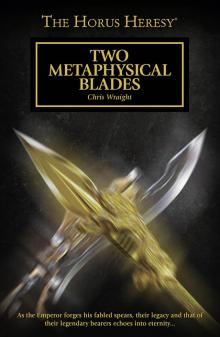 Two Metaphysical Blades
Two Metaphysical Blades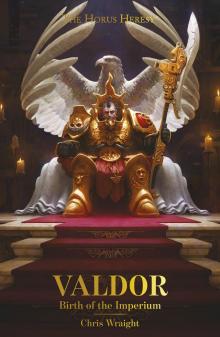 Valdor: Birth of the Imperium
Valdor: Birth of the Imperium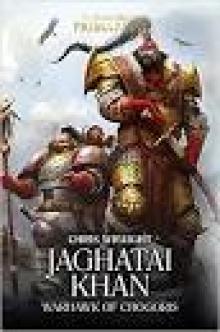 JAGHATAI KHAN WARHAWK OF CHOGORIS
JAGHATAI KHAN WARHAWK OF CHOGORIS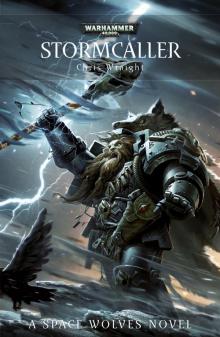 Stormcaller
Stormcaller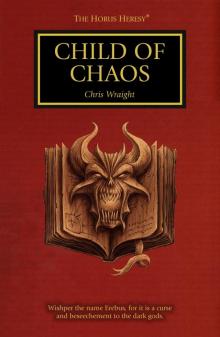 Child of Chaos
Child of Chaos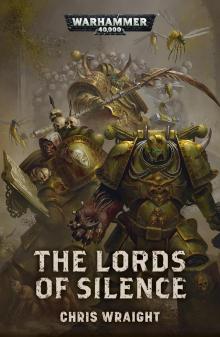 The Lords of Silence
The Lords of Silence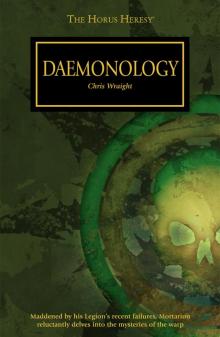 Daemonology
Daemonology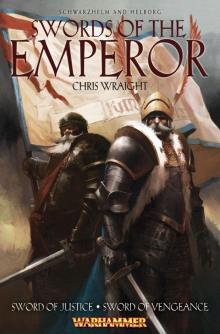 Swords of the Emperor
Swords of the Emperor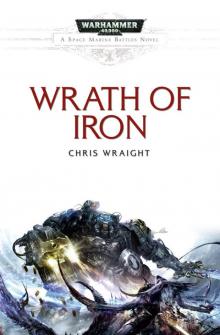 Wrath of Iron
Wrath of Iron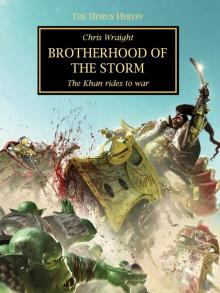 Brothers of the Storm
Brothers of the Storm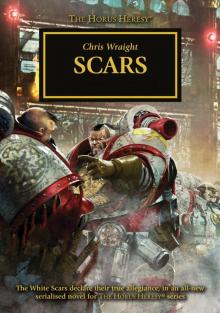 Horus Heresy: Scars
Horus Heresy: Scars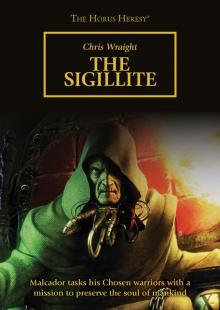 The Sigillite
The Sigillite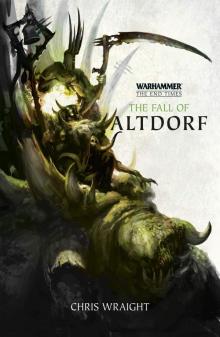 The End Times | The Fall of Altdorf
The End Times | The Fall of Altdorf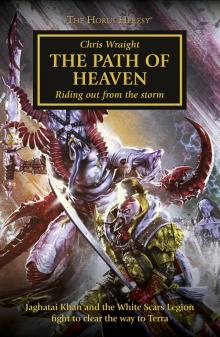 The Path of Heaven
The Path of Heaven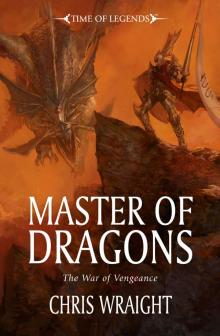 Master of Dragons
Master of Dragons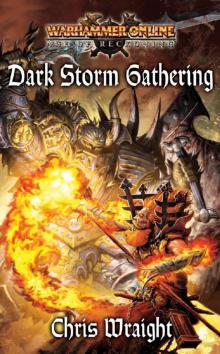 WH-Warhammer Online-Age of Reckoning 02(R)-Dark Storm Gathering
WH-Warhammer Online-Age of Reckoning 02(R)-Dark Storm Gathering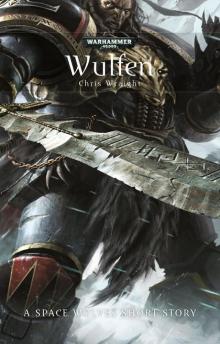 Wulfen
Wulfen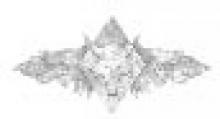 Battle Of The Fang
Battle Of The Fang Onyx
Onyx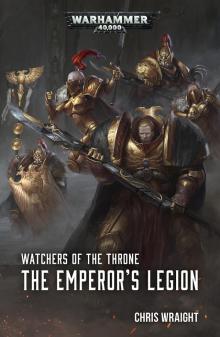 Watchers of the Throne: The Emperor’s Legion
Watchers of the Throne: The Emperor’s Legion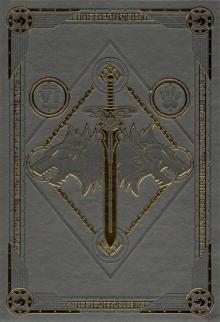 Leman Russ: The Great Wolf
Leman Russ: The Great Wolf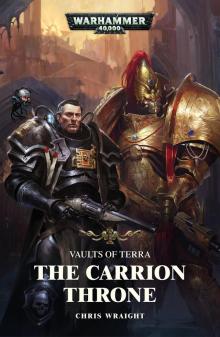 Vaults of Terra: The Carrion Throne
Vaults of Terra: The Carrion Throne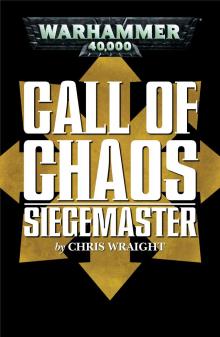 Siegemaster
Siegemaster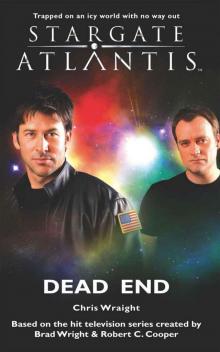 STARGATE ATLANTIS: Dead End
STARGATE ATLANTIS: Dead End Scars
Scars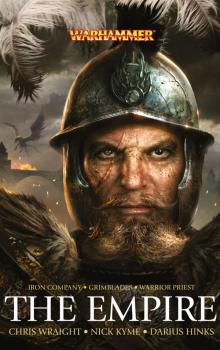 The Empire Omnibus
The Empire Omnibus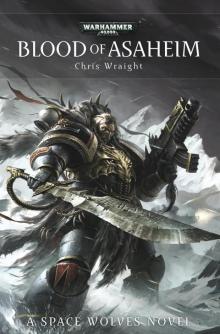 Blood of Asaheim
Blood of Asaheim